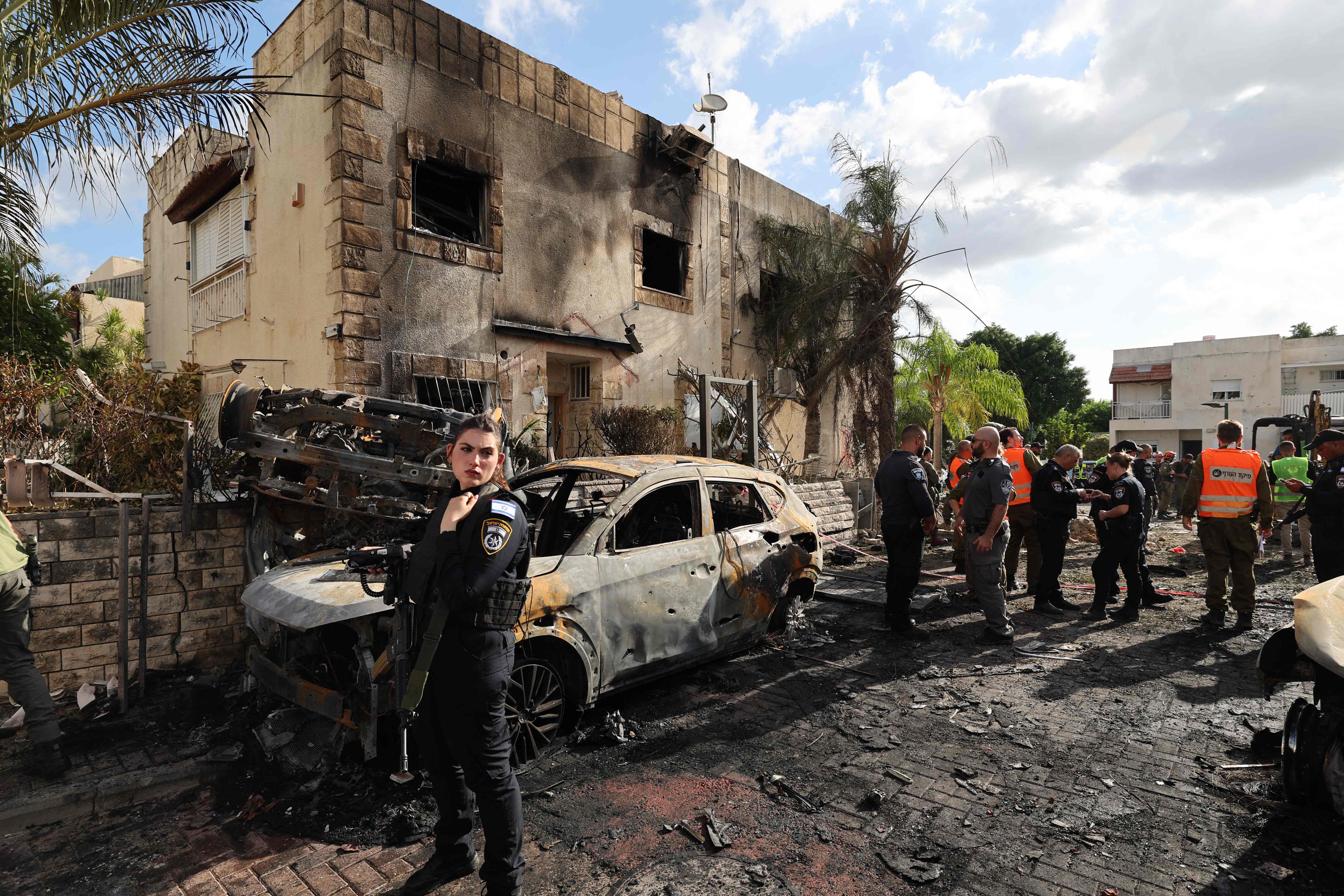Calls to step back from brink as Hezb, Zionists trade fire

HAIFA/BEIRUT/GAZA: The Zionist entity and Hezbollah threatened on Sunday to escalate their cross-border attacks despite a chorus of international calls for both sides to step back from the brink of all-out war. Zionist Prime Minister Benjamin Netanyahu said after a night of intense rocket fire from Lebanon that the Zionist entity has dealt “a series of blows on Hezbollah that it could have never imagined”.
Hezbollah was equally defiant, with the group’s deputy chief Naim Qassem saying it was in a “new phase” in its battle against the Zionist entity. They spoke nearly a year after the outbreak of the Gaza war and after attacks on the Zionist entity sent hundreds of thousands of people to bomb shelters and caused damage in the area of Haifa city. The Zionist entity’s key ally the United States said
Sunday military escalation is not in the Zionist entity’s “best interest”. White House National Security spokesman John Kirby said “we still believe that there can be time and space for a diplomatic solution”. UN chief Antonio Guterres warned of the risk of Lebanon becoming “another Gaza”. Speaking ahead of the annual UN General Assembly in New York, he nonetheless added it was “clear that both sides are not interested in a ceasefire” in the Gaza war.
British Foreign Secretary David Lammy called for an “immediate ceasefire” after a “worrying escalation”, and EU foreign policy chief Josep Borrell echoed the ceasefire call, saying Europe was “extremely concerned”. Hezbollah rocket fire reached Kiryat Bialik on the edge of the Zionist entity’s largest city in the north, Haifa, leaving a building in flames, another pockmarked with shrapnel and vehicles incinerated. “This is not pleasant. This is war,” said one resident, Sharon Hacmishvili.
Hamas in a statement on Sunday hailed Hezbollah for its “resilience and bravery” in attacking the Zionist entity. The Zionist entity has signaled its intention to shift focus to Iran-backed Hezbollah after nearly a year of cross-border fire that began in October in what Hezbollah calls support for Hamas fighting the Zionist entity.
Friday’s Zionist air strike in a densely populated Hezbollah stronghold in southern Beirut killed the head of Hezbollah’s elite Radwan Force, Ibrahim Aqil. The Lebanese health ministry said the strike killed 45 people. It came after a series of coordinated communication device blasts on Tuesday and Wednesday that killed 39 people and wounded almost 3,000, and which have been blamed on the Zionist entity.
Speaking at Aqil’s funeral in Beirut Sunday, Qassem said: “We have entered a new phase, namely an open reckoning” with the Zionist entity. “Threats will not stop us... We are ready to face all military possibilities.” Hezbollah’s Radwan Force has spearheaded its ground operations, and the Zionist entity has repeatedly called for its fighters to be pushed back from the border.
UN special coordinator for Lebanon Jeanine Hennis-Plasschaert posted on X that the region was “on the brink of an imminent catastrophe”. “It cannot be overstated enough: There is NO military solution that will make either side safer,” she wrote. The Zionist army said more than 150 rockets, missiles and drones were fired at its territory during the night and early Sunday, most from Lebanon. It said it attacked Hezbollah targets in southern Lebanon.
Lebanon’s health ministry said three people were killed in Zionist strikes on southern areas, and Hezbollah announced two fighters were killed. The Zionist civil defense agency ordered all schools in the north closed after the rocket fire. “It reminds me of October 7 when everybody stayed home,” Haifa resident Patrice Wolff told AFP.
Hezbollah said it had targeted Zionist military production facilities and an air base in the Haifa area after last week’s communication device blasts. “In an initial response” to the explosions of the pagers and two-way radios, Hezbollah said it “bombed the Rafael military industry complexes” in the Zionist entity with “dozens” of rockets.
It said it targeted Ramat David airbase with Fadi-1 and Fadi-2 rockets. The site is among the deepest inside the Zionist entity so far targeted, and this appeared to be Hezbollah’s first use of that rocket type during the Gaza war. Hezbollah chief Hassan Nasrallah has acknowledged that the communication devices attack was “unprecedented”. He vowed that the Zionist entity — which has not commented on the blasts — would face retribution.
The Zionist military offensive has killed at least 41,431 people in Gaza, most of them civilians. Civil defense rescuers in Gaza City said a Zionist strike Sunday on a school used as shelter by displaced Palestinians killed at least seven people, the latest of numerous such incidents. – Agencies
















